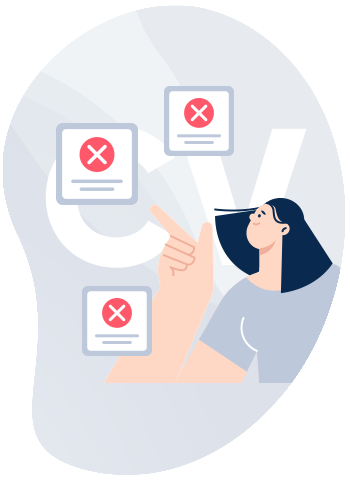Recruiters often scan dozens, sometimes even hundreds, of CVs for a single role. The bad news? They typically spend just 6 to 8 seconds reviewing each one. That quick glance is often your only shot at making a solid first impression.
The good news? Writing a clear, modern, and effective CV doesn’t need to be complicated or expensive. You don’t need to hire a CV-writing service. What you do need is a clean, focused document that avoids the most common mistakes.
Here are our top picks of what not to include in a resume in 2025… And what to do instead!
What Not to Put On a Resume?
1. Your exact address
There’s no reason to include your full street address anymore. It doesn’t help your application and raises unnecessary privacy concerns.
What to do instead? Keep it general. Usually city or region is enough.
2. Early education
Once you’ve completed your university degree and/or advanced certifications, there’s no need to mention your high school. These early academic details don’t provide value to hiring managers and only waste space.
What to do instead? Focus solely on the most relevant academic achievements.
3. Irrelevant work experience
Not all past jobs deserve a spot on your CV. Unrelated side gigs or student jobs can usually be skipped unless they show relevant soft skills.
What to do instead? Tailor your work history to emphasize experiences that support the position. If you’re entering a new field, highlight transferable skills from past roles.
4. Too many hobbies
A long list of hobbies rarely helps your case. It’s optional, and if done poorly, it distracts from your qualifications.
What to do instead? Mention one or two interests only if they show relevant traits or could spark a conversation.
5. Vague “About Me” section
If your summary is too broad or doesn’t match the role, it will confuse the recruiter and weaken your message.
What to do instead? Tailor your introduction to the position. Be specific about your skills, goals, and value.
6. Exaggerated skills or experience
Lying on your CV might get you an interview, but it can just as easily get you disqualified. It’s tempting to stretch the truth, especially about skills like language fluency or software knowledge, but lies like these are easily caught during interviews or assessments.
What to do instead? Be honest. If you’re still learning something, say so. Employers usually value candidates who show commitment to growth.
7. Skill bars, graphs, and charts
Star ratings and sliders may look trendy but rarely help your case. They’re subjective and often meaningless in real evaluations.
What to do instead? Use standard terms like Basic, Intermediate, or Advanced. For language skills, refer to CEFR levels (A1 to C2).
8. Complicated design
Too many fonts, colors, or unusual layouts can make your resume difficult to read or process through ATS systems.
What to do instead? Stick to clean, professional designs. If you work in a creative field (like design or marketing), a bit of flair is okay, as long as you keep it functional.
9. Headshot photos
In most Western job markets, photos on CVs are no longer standard. Including one can open the door to unconscious bias or even discrimination.
What to do instead: Unless the role or location clearly calls for it, leave the photo out.
10. References
Recruiters rarely need references during the early stages. Including them takes up space and exposes personal data.
What to do instead: Simply write “References available upon request.”
Bonus: 3 Embarrassing CV Mistakes to Avoid
11. Ditch unprofessional email addresses
Your email should reflect professionalism. Addresses like cutegirl1995@hotmail.com or gamingchamp88@gmail.com will hurt your credibility.
What to do instead? Create a simple, clean email using your name (e.g., firstname.lastname@gmail.com).
12. Avoid spelling and grammar mistakes
Typos signal a lack of attention to detail. In many roles, that alone can cost you the opportunity.
What to do instead? Use a grammar checker and have someone else review your CV before you send it.
13. Don’t mention your marital status
Mentioning marital status is a relic of old-school CVs. It’s irrelevant and can unfairly influence hiring decisions.
What to do instead? Stick to information that demonstrates your qualifications and value as a professional.
Conclusion: How to Fix Your CV and Get Noticed
A good CV doesn’t say everything. It says the right things, clearly and briefly.
Take the time to review and refine your resume. Read your CV like a hiring manager, not just a candidate: focus on relevance, keep it simple, and remove anything that won’t directly help you get the job you want.
When you remove the noise, recruiters can focus on what matters: your fit for the role. A cleaner, smarter CV gives you a better shot at getting noticed and getting hired.
FAQ
Q1: How do I make my CV stand out?
Tailor it to the job. Focus on relevant skills and experience. Use action verbs and quantifiable results. Keep the layout clean with enough white space.
Q2: What are the most common CV mistakes in 2025?
Still common: irrelevant experience, outdated designs, personal details (like marital status), and vague summaries.
Q3: Should I include job gaps?
Yes. Briefly explain them in your CV or cover letter. Mention what you did (i.e., travel, caregiving, freelancing) and what you learned.
Q4: Should I list social media on my CV?
Only if it’s relevant. LinkedIn is fine. Skip personal accounts unless they showcase your work.
Q5: Should I use skill bars or graphs?
No. Stick to clear labels like “Intermediate” or “Advanced,” or use CEFR levels for languages.

